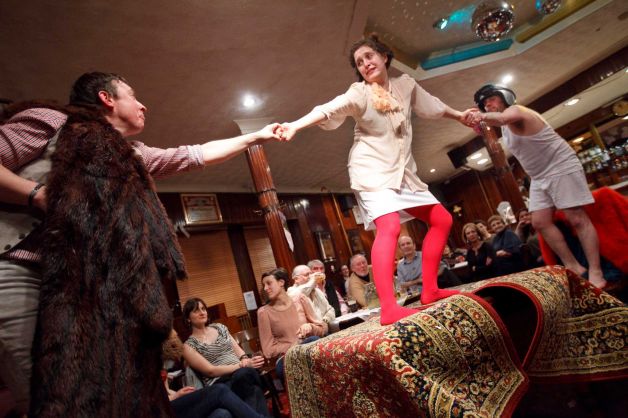Review of Our Ladies of Perpetual Succour, International Festival of Arts & Ideas
The featured theatrical event of this year’s Arts & Ideas is a co-production between the National Theatre of Scotland and Live Theatre, New Castle. Lee Hall, who turned Billy Elliott into a successful musical, adapts Alan Warner’s novel The Sopranos—about a group of Scots Catholic school girls run amok in the capitol—for the stage as Our Ladies of Perpetual Succour, directed by Vicky Featherstone, veteran director of many NTS productions.
Lewd, crude, and rude, Our Ladies follows the exploits of six teen girls as they let loose within the confines of their day and age. Which is to say, in the words of Pulp’s song “Common People,” “You can dance, and drink, and screw / Because there’s nothing else to do.” The show energetically, and relentlessly, showcases the time of life when that was enough. To say, as the Pulp song does outright, that such are the only opportunities for fun and self-expression among the “common people,” or working class, as all these ladies are (only one, Kay, is college-bound), is to recognize the subtext to these high spirits. They’ve got to get their rocks off young because it’s all downhill from here.
l to r.: Caroline Deyga, Kirsty MacLaren, Joanne McGuiness, Frances Mayli McCann, Dawn Sievewright, Karen Fishwick (photo: Manuel Harlan)
The salty language, slang, and dense Scots accents of these gurls (think Maggie’s Smith’s pronunciation in The Prime of Miss Jean Brodie whilst touting the crème de la crème) keeps it all very ribald and just comprehensible enough. Don’t worry, when some narrative business is important, such as Orla (Joan McGuiness)’s account of how she tries to shag a fellow patient in a hospital with unfortunate results, you’ll follow it just fine. Orla has cancer and so her efforts to “dew et” while still able are understandable, though trying to get off a guy with a urine bag is not only a bit daft, it’s pathetic. And that’s the tone of much of the show—its hi-jinx are high times with an undertone of pathos.
The best dramatic situation along those lines comes from Fionnula (Dawn Sievewright) deciding she might like girls better than boys and trying out her newfound emotions on Kay (Karen Fishwick), who’s been in bed with both at the same time. Efforts to suggest the bittersweetness of the girls’ tender age helps give some depth to a show which otherwise might simply seem the Scots female version of bro-mance films of frat boys trying to do the dirty. And it does seem like that often enough.
And there’s music too, played live onstage with conviction, though if the notion of teens rocking out to ELO tunes seems a bit contradictory, you’re not alone. Still, Jeff Lynne provides some decent songs like “Long Black Road,” “Don’t Bring Me Down” (a very spirited performance), and “Wild West Hero” (used very effectively). Then there are the hits from the classical canon that the girls sing with lovely, angelic voices, making clear why the nuns who teach them might be fooled into thinking they can be trusted on their own. Some—like Handel’s “My Heart is Inditing” and Williams’ “O Taste and See”—get a nice little spin when heard from the girls’ perspective.
l to r: Frances Mayli McCann, Dawn Sievewright, Caroline Deyga, Kirsty MacLaren, Karen Fishwick, Joanne McGuiness (photo: Manuel Harlan)
The music adds distraction but it also draws out the show’s length, which begins to feel interminable. By the time the girls are writhing about, getting their trip on with Magic Mushroom Lager, I had hopes their odyssey was near its end, but they still have to get back to Oban in time for that last dance at the Mantrap. You might be feeling up to a pub-crawl of your own by that point.
As Kay, Karen Fishwick is a cut above—she can do querulous old man, earnest young boy, and melancholy dude, and gives Kay nuances of conflict. Some of the others, when called upon to enact males, seem not much different than they are as girls, which I don’t think is deliberate, though maybe. Frances Mayli McCann and Caroline Deyga are compelling musical performers with a good sense of rhythm that enlivens the musical parts. As somewhat sad Orla, McGuinness gets a touching scene with Kirsty MacLaren whose nerdy boy character is memorable. And Sievewright handles well the role of Fionnula, the girl with something other than boys on her mind.
Plotwise, the fact that girls do go boy crazy at a certain age is certainly not new, and that Catholic girls are anything but chaste is not much by way of comic contrast. Full disclosure: I was in a Catholic school among Catholic schoolgirls up to age 13 and I remember many as far more mature than this lot. What’s more, I didn’t think, until seeing Our Ladies, that anything would make me sympathetic to the nuns overseeing teens and attempting to impose standards of conduct. Guess I’ll have to rethink that. As Eugene O’Neill says, “If you can’t be good, you can at least be careful.” Maybe our ladies will catch on before too much damage is done.
International Festival of Arts & Ideas presents
Our Ladies of Perpetual Succour
Based on The Sopranos by Alan Warner
Adapted by Lee Hall
Directed by Vicky Featherstone
Music Sourced, Arranged and Supervised by Martin Lowe
Designer: Chloe Lamford; Lighting Designer: Imogen Knight; Sound Designer: Lizzie Powell; Associate Director: Debbie Hannan; Associate Music Supervisor: Stuart Morley; Co-Casting Directors: Amy Ball, Laura Donnelly
The Band: Laura Bangay, band leader/keyboard; Becky Brass, percussion; Emily Linden, guitar
Cast: Caroline Deyga; Kirsty Findlay; Karen Fishwick; Joanne McGuiness; Kirsty MacLaren; Frances Mayli McGann; Dawn Sievewright
June 10-25, at 2 p.m. and 8 p.m.
Yale Repertory Theater




